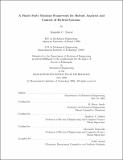A finite state machine framework for robust analysis and control of hybrid systems
Author(s)
Tarraf, Danielle C. (Danielle Charles), 1974-
DownloadFull printable version (666.4Kb)
Other Contributors
Massachusetts Institute of Technology. Dept. of Mechanical Engineering.
Advisor
Munther A. Dahleh and Alexandre Megretski.
Terms of use
Metadata
Show full item recordAbstract
Hybrid systems, describing interactions between analog and discrete dynamics, are pervasive in engineered systems and pose unique, challenging performance verification and control synthesis problems. Existing approaches either lead to computationally intensive and sometimes undecidable problems, or make use of highly specialized discrete abstractions with questionable robustness properties. The thesis addresses some of these challenges by developing a systematic, computationally tractable approach for design and certification of systems with discrete, finite-valued actuation and sensing. This approach is inspired by classical robust control, and is based on the use of finite state machines as nominal models of the hybrid systems. The development does not assume a particular algebraic or topological structure on the signal sets. The thesis adopts an input/output view of systems, proposes specific classes of inequality constraints to describe performance objectives, and presents corresponding 'small gain' type arguments for robust performance verification. A notion of approximation that is compatible with the goal of controller synthesis is defined. An approximation architecture that is capable of handling unstable systems is also proposed. (cont.) Constructive algorithms for generating finite state machine approximations of the hybrid systems of interest, and for efficiently computing a-posteriori bounds on the approximation error are presented. Analysis of finite state machine models, which reduces to searching for an appropriate storage function, is also shown to be related to the problem of checking for the existence of negative cost cycles in a network, thus allowing for a verification algorithm with polynomial worst-case complexity. Synthesis of robust control laws is shown to reduce to solving a discrete, infinite horizon min-max problem. The resulting controllers consist of a finite state machine state observer for the hybrid system and a memoryless full state feedback switching control law. The use of this framework is demonstrated through a simple benchmark example, the problem of stabilizing a double integrator using switched gain feedback and binary sensing. Finally, some extensions to incremental performance objectives and robustness measures are presented.
Description
Thesis (Ph. D.)--Massachusetts Institute of Technology, Dept. of Mechanical Engineering, 2006. This electronic version was submitted by the student author. The certified thesis is available in the Institute Archives and Special Collections. Includes bibliographical references (p. 107-115).
Date issued
2006Department
Massachusetts Institute of Technology. Department of Mechanical EngineeringPublisher
Massachusetts Institute of Technology
Keywords
Mechanical Engineering.